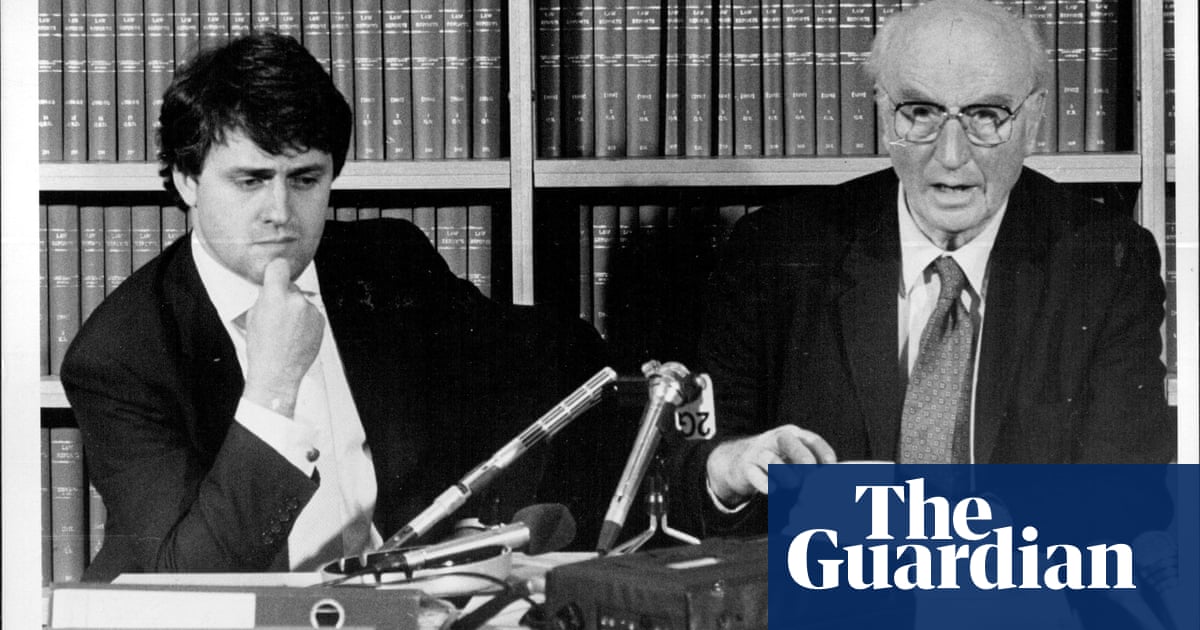Malcolm Turnbull condemns UK’s ‘extraordinary’ hypocrisy over Spycatcher affair

The former Australian prime minister Malcolm Turnbull has accused the UK government of hypocrisy and concealment over the way it continues to block the release of secret files about the Spycatcher affair.
Before entering politics, Turnbull was a barrister for Peter Wright, a retired senior MI5 intelligence officer who revealed a series of illegal activities by the British security services in his memoir Spycatcher.
British officials have repeatedly refused to disclose 32 files concerning the Spycatcher affair. “There is something that they are still trying to hide,” Turnbull said. He added: “What’s the public interest in keeping them suppressed?”
Spycatcher detailed how MI5 bugged embassies, plotted against the former prime minister Harold Wilson, and was run for almost a decade by a suspected Soviet agent, Roger Hollis.
Turnbull represented Wright in a 1986 court battle in Australia that caused Margaret Thatcher global humiliation over her government’s failure to stop publication of the book.
During the trial Turnbull forced Thatcher’s cabinet secretary Robert Armstrong to admit he had been “economical with the truth”. Previously classified prime ministerial papers released last year revealed just how brazenly Armstrong had lied to the Australian court and how Thatcher had misled parliament.
The damning memos were released after a long campaign by the journalist and author Tim Tate for his book To Catch a Spy: how the Spycatcher affair brought MI5 in from the cold.
Speaking at an event to mark the book’s publication at the Chelsea history festival in London, Turnbull said: “Armstrong’s perjury was really extraordinary.”
Cross-examining Armstrong during the 1986 trial, Turnbull asked Armstrong whether No 10 and MI5 had agreed to cooperate with the right-leaning writer Chapman Pincher in a book about Hollis in the hope of securing a “safely conservative” account of Hollis’s suspected treachery. Armstrong dismissed this as “a very ingenious conspiracy theory” and “totally untrue”.
But the memos released last year showed Armstrong had in fact instructed how Pincher should be briefed because he believed he would write a “sympathetic presentation”. The memos were signed off with Thatcher’s initials. The former prime minister later told parliament that a secret investigation into Hollis found no evidence that he was a Soviet agent, when it fact it had warned there was a 20% chance that he was a traitor.
Turnbull said: “Armstrong’s perjury was really extraordinary. Since then I’ve obviously had a lot of experience as a prime minister in government. To me, it is still mind boggling that the cabinet secretary of the United Kingdom feels so entitled that he could go into a witness box and tell a dead set 100% lie.
“Not a fudge, a dead set lie, knowing that what he described as ‘totally untrue’ was, in fact, totally true, and evidenced by a memo signed by him sitting in a filing cabinet in Downing Street. The fact that he felt so invulnerable, really staggers me.”
Turnbull also pointed out that years before those memos were declassified they were made available to Thatcher’s biographer Charles Moore.
He said: “Interestingly Charles Moore was able to read them, for his official biography of Maggie Thatcher, and even Charles, who is a very sympathetic biographer, was unable to defend Armstrong.”
He said giving Moore access to secret memos had echoes of how Thatcher’s government tried to brief Pincher in the hope of securing a sympathetic account. He said: “Of course it’s hypocritical, it’s the same old thing all over again. If it has been made available to Charles Moore it should be made available to everyone.”
Turnbull said he had been discussing the Spycatcher affair recently, and Armstrong’s perjury, with the former Australian politician Kim Beazley. He said: “We could not imagine an Australian civil servant doing that. But maybe Armstrong was unique. It was a shocking act of perjury, Armstrong was bang to rights.”
Referring to the Spycatcher trial, Turnbull added: “I accused Armstrong of lying on several occasions, and it turns out I was right on several occasions.”
Most government documents are released after 30 years, but officials have cited various exemptions under the Freedom of Information Act to block publication of the 32 Spycatcher files.
Armstrong died in 2020. Wright died in 1995.
Related
Newspaper headlines: ‘Putin’s dirty work in UK’ and ‘Honeytrap spies’
The Times focuses, external on Donald Trump's latest comments about the war in Ukraine. Its headline quotes the US president, who said Vladimir Putin was "doing
‘This could end in World War Three,’ warns Trump as…
7 March 2025, 17:31 | Updated: 7 March 2025, 18:06 'This could end in Worl
Met Office ‘polar vortex’ update as temperatures to plummet
The weather is expected to quickly change after a spell of sunshineThe Met Office has warned that "colder weather is on the way."(Image: Liverpool ECHO)It is fo
British Pie Awards 2025: Naan better as kebab pie wins…
The Turkish-tinged creation by Boghall Butchers - which is celebrating its 50th year in business - won through in the newly-formed fusion category, which also f













